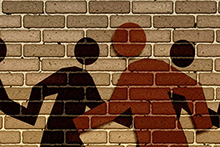
‘We should have more trust in one another; people are actually very trustworthy’
People don’t have enough faith in the trustworthiness of others, says psychologist Manon Schutter in her dissertation. In it, she also highlights the negative effects of being actively distrusted. How does distrust affect a relationship in the future?
Trust is generally seen as the glue that holds people together in social interactions, whether these are romantic or business relationships, or a single anonymous interaction with another party. Manon Schutter, a social psychologist, explains: ‘You need trust to be able to interact with other people. My research focuses on trust between two individuals. When considering trust in the government, for example, other aspects plan a role, but the general mechanisms still apply. For example, positive expectations about the other party’s reaction and the willingness to be in a position of dependence.’
You achieve more together than on your own
‘When there is mutual trust, you can achieve more than two individuals acting separately,’ Schutter explains. ‘Dependability is the response to that trust. In interactions it works both ways; you have trust in one another and you both exhibit trustworthiness. But, what about if I buy something from you as a one-off transaction on E-bay? I first have to transfer my money to you, and to do that I need to have trust in you. And your dependability is the response to that trust, because you do actually send me what we have agreed.’
Manon Schutter: 'Remarkably enough, we saw that people who were actively distrusted react less socially not only in a subsequent interaction, but also towards a person who was not involved in the original meeting.'
Distrust has consequences
Distrust is new in the research of Schutter. 'We looked at what distrust does and how you react when you meet one another again. If at your first meeting you are actively distrusted, you experience more negative emotions and are less social in a subsequent interaction. Remarkably enough, we saw that people who were actively distrusted react less socially not only in a subsequent interaction, but also towards a person who was not involved in the original meeting. Our conclusion is that distrust is costly. Not only do you miss out on potential revenues because you could collectively achieve more by actually trusting each other, but our research also adds to this the negative consequences for subsequent interactions.’
Trust and distributing money
The role of trust has been widely studied in the so-called ‘trust game’, where the test subjects can distribute money to one another. Schutter studied factors that can influence trust and trustworthiness. ‘When there is a longer interval between two decisions by two people, we see a decline in trust. But we also see that the other party remains equally reliable, regardless of whether the trust was bestowed on them immediately prior to this or a month before. We order goods online, where distance also plays a role. If I order something from the other side of the world, the transaction takes longer and I could potentially be less confident about receiving the goods. Clearly, there are more factors involved in this example, but my research shows that the “time” aspect on its own does not negatively affect the trustworthiness of the other party.’
Trust and reciprocity
‘For a relationship of trust, you also need reciprocity. If I do something nice for you, you will probably do something nice for me. That’s a very strong norm that people have. But what about if you can’t check whether there really is reciprocity? Am I then still prepared to trust the other party? And how does that affect dependability? In my research, we saw different patterns here. Some people are prepared to keep possible extra money as long as the other party can’t check up on them. The thinking is that what you don’t know can’t hurt you. The participants don’t do that if the situation is completely transparent. We see a variation in dependability emerging here, although we also see that those who opt for self-interest mostly do so without harming the other party. They might, for example, give the other party the share that they were expecting, but keep the extra money for themselves. They could, equally, have given the other party nothing, but they almost never do that.’

Reconciling conflicting interests
What decisions do individuals make when they have to weigh their immediate self-interest against a long-term collective interest? And what factors influence these decisions? Leiden psychologists design experiments to discover how people deal with social dilemmas, in an attempt to find patterns in human behaviour.
Self-interest versus group interest
